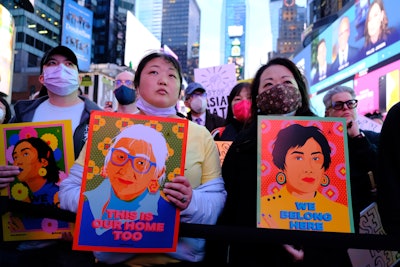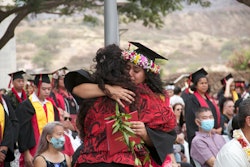
That’s according to the second report from Stop AAPI Hate, a coalition between equity organization AAPI Equity Alliance, civil rights group Chinese for Affirmative Action, and San Francisco State University’s Asian American Studies program. The new report, Two Years and Thousands of Voices, highlights data collected through their website between March 19, 2020 and March 31, 2022 and documents almost 11,500 incidents of anti-AAPI hate.
The majority of those instances were verbal harassment that occurred in public spaces, disproportionately targeting women and vulnerable populations. Most reported incidents do not meet the criteria to qualify as criminal hate crimes, which means they cannot be prosecuted.
To reduce discrimination and bias, the report recommends policies that strengthen and improve education, robust community responses to hateful incidents, and an expansion of civil rights. Experts said that institutions of higher education have a critical role to play in this work.
“The surge of racism has continued against AAPI—these are horrific, traumatizing incidents, one out of five respondents experienced trauma,” said Dr. Russell Mark Jeung, a professor of Asian American studies at San Francisco State University and Stop AAPI Hate co-founder. “What’s new is that the community overall has really fought back well, and we’ve seen some remarkable changes and efforts to resist the racism in the last year.”
Increased community responses include recent successful pushes from activists to include AAPI content in K-12 curriculum in eight states, and Assembly Bill 2448 in California, which would classify harassment as a public health issue impacting all marginalized groups.
 Dr. Vivian Louie, professor of urban policy and planning and director of the Asian American studies program and center at Hunter College in New York City.
Dr. Vivian Louie, professor of urban policy and planning and director of the Asian American studies program and center at Hunter College in New York City.
Dr. Mike Hoa Nguyen, an assistant professor of education at New York University, said that the report shows that anti-AAPI hate is “part of a broader problem, not just a current one.”
“What this report says is that too often this community is ignored and not talked about. A lot of work needs to be done to support AAPI communities,” said Nguyen. “Historians have documented racial incidents, violence, and public policies that have targeted AAPIs in the US. What we’re seeing today is partially legacy to those historical incidences that we need to address, teach, and well as current incidences.”
Earlier this year, The Asian American Foundation found 42% of Americans could not name a single historical event involving AAPI, and 58% could not name a single AAPI individual important to American life. Louie said that higher education institutions have the ability to counter this unfamiliarity.
Hunter College's Asian American studies program offers 23 courses that highlight the impact of AAPI individuals, culture, art and sciences on the American story. Hunter’s recently launched Asian American Studies Center will seek to create programming that educates the public at large.
“How do they get this information if we don’t bring it to them? There should always be opportunities for adults to learn,” said Louie. “This kind of education is not only for AAPI. We’re all in it together. Asian American studies is knowledge that everyone should have, regardless of their background.”
 Dr. Russell Mark Jeung, professor of Asian American studies at San Francisco State University and Stop AAPI Hate co-founder.
Dr. Russell Mark Jeung, professor of Asian American studies at San Francisco State University and Stop AAPI Hate co-founder.
“We need curriculum that reflects student populations, relevant to meet the needs of our communities,” said Russell. “We think ethnic studies help students have cross cultural competencies, critical thinking and communication skills to support a range of people.”
At the University of Michigan, Dr. Melissa Borja, an assistant professor in the Asian/Pacific Islander American studies program, led a study on how the news media reports incidents of AAPI hate. For Borja, this latest report from Stop AAPI Hate is important because many in the AAPI community are worried that American attention to the issue of anti-AAPI racism could wane.
“It concerns me that a lot of educational institutions are under scrutiny by elected officials for talking frankly about racism in America. I’d like to see higher education continue to stand by scholars doing research in this area and the students insisting on course offerings related to subject,” said Borja.
Borja also called for institutions to hold themselves accountable to the diversity, equity, and inclusion goals they set in 2020 after the murders of George Floyd, Breonna Taylor, and others.
“Racism has never been a comfortable topic to engage in,” said Borja. “Institutions of higher education can continue to make meaningful efforts to support AAPIs and other people of color against discrimination and bias. Follow through on your promises you made.”
Liann Herder can be reached at [email protected].






















